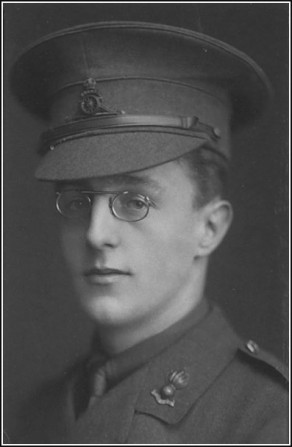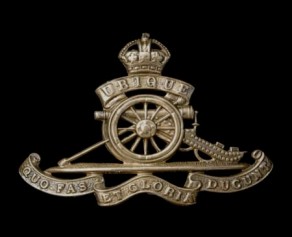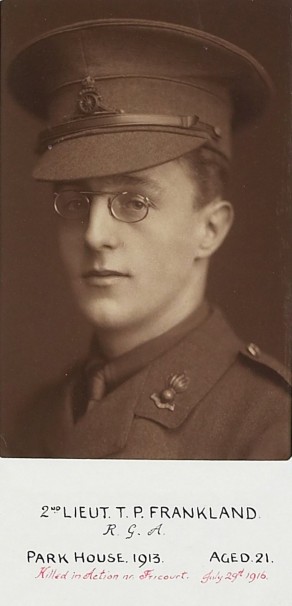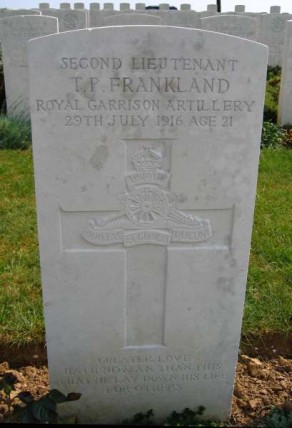‘Clitheroe Times’ (13 November 1914)
(Kindly supplied by Shirley Penman of Clitheroe and Dorothy Falshaw of Gisburn)
[Untitled article]
From the ‘London Gazette’: ‘Regular Forces, Royal Field Artillery: T.P. Frankland, to be 2nd lieutenant.’ Lieut. Frankland, who is to report at Exeter, is an old Tonbridge boy, and is the elder son of Mr. Frankland, of White Hall, Grindleton.
‘Clitheroe Times’ (4 August 1916
(Kindly supplied by Shirley Penman of Clitheroe and Dorothy Falshaw of Gisburn)
GRINDLETON OFFICER KILLED
SECOND-LIEUTENANT T.P. FRANKLAND
Yesterday morning, Mr. and Mrs. George Frankland, of White Hall, Grindleton, and formerly of ‘Highbrake,’ Clitheroe, received an official intimation that their eldest son, Second-Lieutenant T.P. Frankland, had been killed in action. Lieutenant Frankland, who was 21 years of age, was educated at Clitheroe Grammar School and at Tonbridge School. He received his commission in the Royal Field Artillery on November 7th, 1914, and was gazetted to the Royal Garrison Artillery on February 3rd, 1915. He had been selected for a commission in the Regular Army, and spent the intervening months between selection and gazetted announcement at Malta. Deep sympathy will be extended to Mr. and Mrs. Frankland and family.
‘Clitheroe Times’ (1 September 1916)
(Kindly supplied by Shirley Penman of Clitheroe and Dorothy Falshaw of Gisburn)
A DARING OFFICER
THE LATE LIEUT. FRANKLAND PRAISED
High praise of the late Lieutenant Frankland is contained in letters received by his father, Mr. George Frankland, of White Hall, Grindleton.
Captain P.M. Pearce (Royal Garrison Artillery) sends a letter expressing deep regret at the loss of Lieutenant T.P. Frankland, who has been killed in action, and adding: “I always considered him an officer of great ability and promise. He was, I know, extremely popular among his comrades in this battery, and I was extremely sorry to lose him. I am sure he must be sadly missed from the battery.”
A touching letter from Second-Lieutenant G. Knight (R.G.A.) had also been received by Mr. Frankland, in which the writer speaks of his close friendship with Lieutenant Frankland, and expresses deep sorrow at his loss. “The news that we were for the front delighted him,” he says, and they left together for Malta in 1915 on the same boat. “Going up the line he was the life and soul of the party. We parted, going to our respective batteries. Later I heard that he did some excellent work, going forward to observe through a fire which drove the other officers back. In June I met him near the enemy’s lines laying wire under shell fire. I asked him to come under cover, but he only grinned and chaffed me. I got him under cover on the pretence of having a chat with me, as we had not met for some time. He then expressed his keen regret at being unable to see his people before coming out. The last I heard of him was on the evening of the 1st July. That day he was the talk and admiration of the infantry and artillery. He went over with the infantry at 7-30, and was with them at the capture of ------- Wood. A little later in the day he established communication from our most forward captured position, and carried out observation for his battery and corps. All his friends were proud of his achievements. I have not heard how the end came, but am sure he met it in the intrepid way he had lived. I mourn him as the straightest boy and staunchest friend I have met.”
‘Clitheroe Advertiser’ (27 September 1918)
(Kindly supplied by Shirley Penman of Clitheroe and Dorothy Falshaw of Gisburn)
[Untitled article]
An official telegram has been received by Mr. Frankland, White Hall, Grindleton, from the India Office stating that his son, Lieut. Alec Frankland, 1st The 101st Grenadiers, Indian Army, is reported wounded, September 20th, on the Palestine Front. No further news has yet been received. Lieut. A. Frankland is the brother of the late Lieut. T.P. Frankland who was killed on the Somme over two years ago.
TONBRIDGE SCHOOL AND THE GREAT WAR OF 1914-1919: A Record of the Services of Tonbridgians in the Great War of 1914 to 1919
FRANKLAND, THOMAS PEMBERTON
2ND LIEUT. / 109TH SIEGE BATTERY, R.G.A.
Died at 29 July 1916
BIOGRAPHY:
2ND LIEUT. THOMAS PEMBERTON FRANKLAND, 109TH SIEGE BATTERY, R.G.A. KILLED IN ACTION NEAR FRICOURT, JULY 29TH, 1916. AGED 21. At the School, 1910—13 (Park House.) 2nd Lieut. T. P. Frankland was the elder son of Mr. and Mrs. George Frankland, of "White Hall, Grindleton, Clitheroe. He and his younger brother, Alec (P.H. 1910—15), came to Tonbridge in May, 1910, and he left in July, 1913. In preparation for a business career in Lancashire he became a student under Dr. Pickard at Blackburn, and obtained a 1st Class Certificate for Chemistry at the Blackburn Technical School in September, 1914. His brother Alec passed into Wellington College, India, in June, 1915, received a commission in the Indian Army, and, being posted to the 101st Grenadiers, was promoted Lieutenant in April, 1917, and Captain in April, 1920. In 1917—18 he saw much service in Egypt and Palestine, especially in General Allenby's Final Offensive. He was wounded in the right shoulder at Selfit on September 20th, 1918, and was mentioned in the Despatch of March, 1919. From February to August, 1919, he served together with Capt. R. E. Le Fleming (P.H. 1908—13) in the Somaliland Garrison, under responsible and trying circumstances, and he received the thanks of the Colonial Office for the arrest of a certain Sultan in Somaliland in August, 1919. Applying tor a commission in the Royal Artillery soon after the outbreak of war, T. P. Frankland was gazetted to the R.F.A. as Temporary 2nd Lieut. November 4th, 1914, and was trained in No. 3B Reserve Brigade R.F.A. at Exeter, but was gazetted to the Royal Garrison Artillery February 3rd, 1915, and attached to No. 3 R.G.A. Depot, Citadel, Plymouth. After completing his training there he was posted to a Siege Battery and went out in May, 1915, with his Battery to Malta. Returning to England early in February, he left again for France on March 30th, 1916, and served in the Ypres district and then on the Somme. Another subaltern in the R.G.A., who went through his training with him, writes :— " I heard that he did some excellent work at Ypres, going forward to observe through a fire that drove other officers back. On June 30th I met him near the enemy's lines laying wire under shell fire. I asked him to come under cover, but he only laughed and chaffed me. . . . The last I heard of him was on the evening of July 1st. That day he was the talk and admiration of the Infantry and Artillery. He went over with the Infantry at 7.30, and was with them at the capture of Shelter Wood. A little later in the day he established communication from our most forward captured position, and carried out observations for his battery and the corps. All his friends were proud of his achievements. I mourn him as the straightest boy and staunchest friend I have met. He was killed, together with two other officers, by a high-explosive shell at about 9 a.m. on July 29th, whilst serving with the 109th Siege Battery, to which he had been transferred on the 26th, and was buried in a cemetery three miles E. of Albert. The CO. of his old Battery, the 51st, wrote:— " He had only joined the 109th Siege Battery a day or two previously, having served with this Battery until then. I always considered him an officer of great ability and promise, and he was, I know, extremely popular among his comrades in this battery, and I was extremely sorry to lose him from the battery." That his efficiency was recognised is shown by the fact that he had been selected for a commission in the Regular Army.
INFORMATION
MILITARY
Citations - The CO. of his old Battery, the 51st, wrote:—"He had only joined the 109th Siege Battery a day or two previously, having served with this Battery until then. I always considered him an officer of great ability and promise, and he was, I know, extremely popular among his comrades in this battery, and I was extremely sorry to lose him from the battery.” That his efficiency was recognised is shown by the fact that he had been selected for a commission in the Regular Army.
Outcome - Died
How He Died - Killed in Action
Where He Died - near Fricourt
Died Age - 21
SCHOOL
School House - Park House
Date Entered - 1910
Date Left - 1913
School Achievements - He and his younger brother Alec (P.H. 1910–15), came to Tonbridge in May, 1910, and he left in July, 1913.
Grindleton War Memorial – Biographical Notes by Shirley Penman
THOMAS FRANKLAND, son of George and Maud nee Pemberton married 1894 Blackburn. Was in Park House, Tonbridge School, 1910-1913. His brother, Alec, also attended. From 1913-14 he attended Blackburn Technical School leaving with a certificate in chemistry.
Gazetted temporary 2nd Lieutenant 4th Nov., 1914 and trained at Exeter before being gazetted to Royal Garrison Artillery on 3rd Feb., 1915 and posted to Malta in May. Returned to England early Feb., 1915 and then to France 30th Mar., 1916. Killed about 9 a.m. by high explosive shell near Fricourt.
Commemorated on:
Clitheroe Royal Grammar School Memorial
Grindleton Memorial
Tonbridge School Memorial, Kent









2 years ago I was finally able to put a face to this name he was my grandfathers older brother, and looks so much like my dad its really kind of surreal. Thanks to everyone who keeps all these archives and service records.